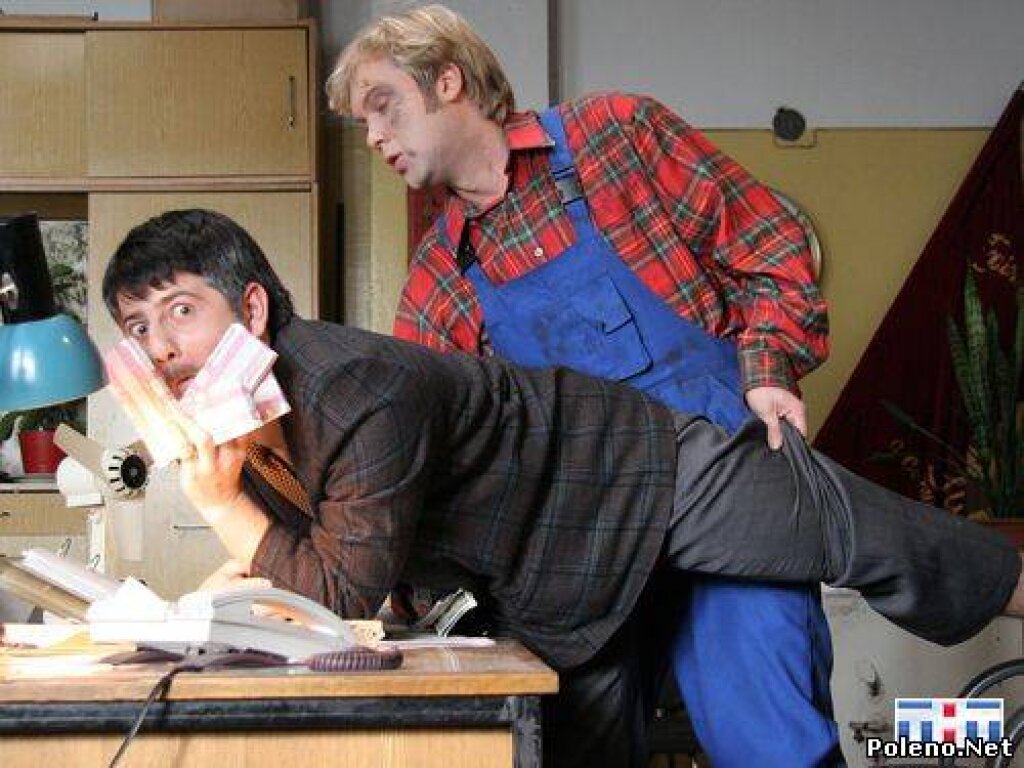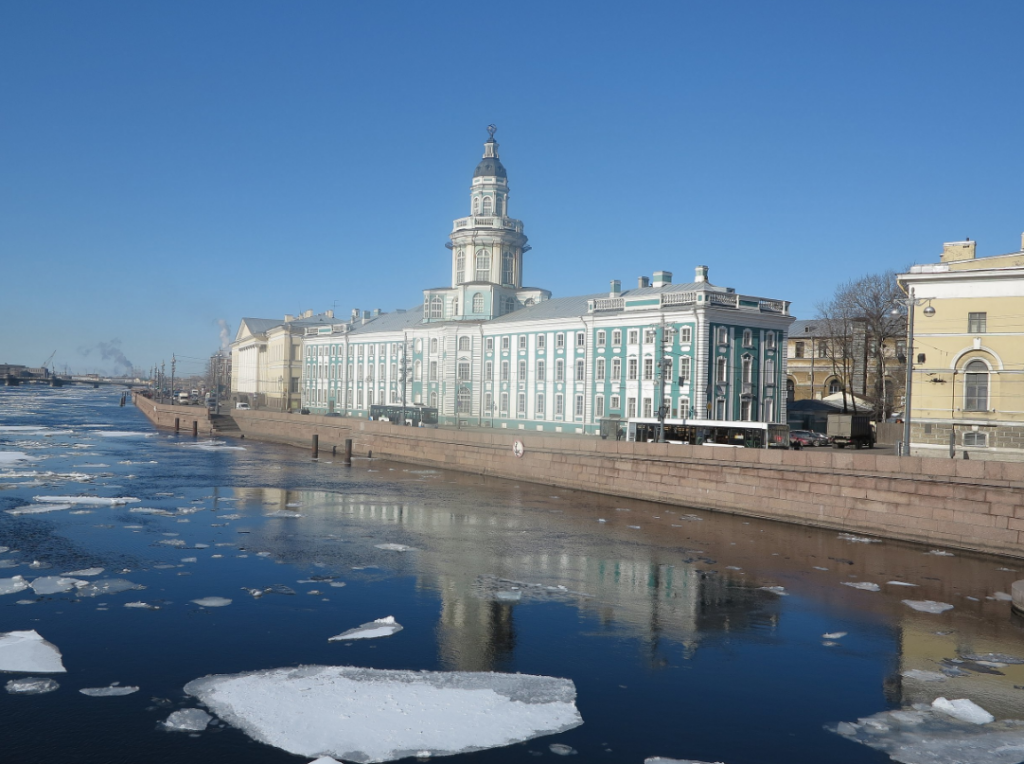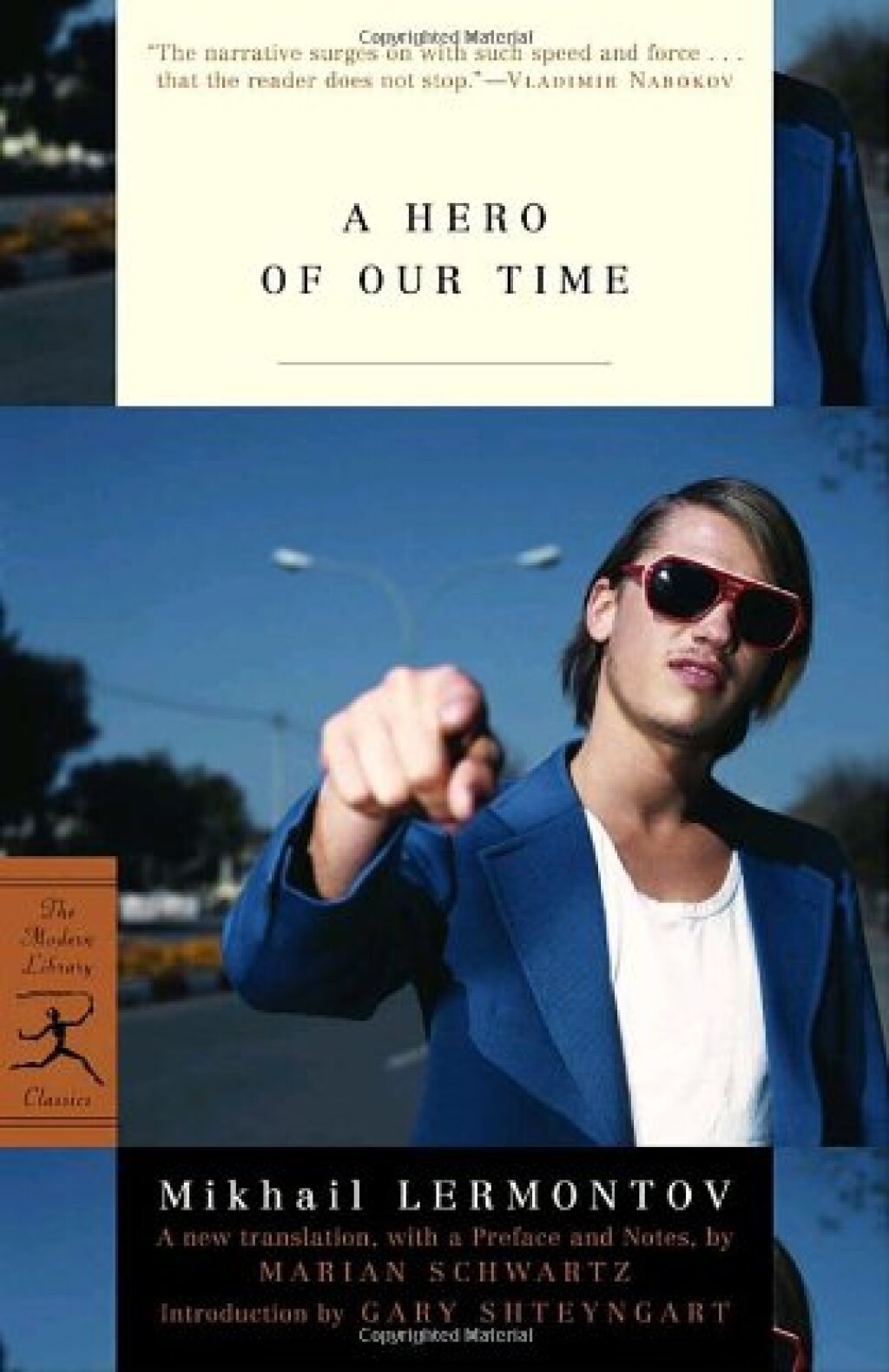Harry Leeds lives in Russia and writes about culture and food (harryleeds.com).
Before this year, most people outside Russia had never heard of Chelyabinsk. To natives, the word Chelyabinsk calls up images of a provincial, industrial city, home to manly man and obedient women. During the Second World War, Chelyabinsk gained some notoriety for producing powerful T-34 tanks (endowing Chelyabinsk with the nom de guerre Tankograd). Chelyabinsk boasts a large university, a well known youth theater, and a monument to Igor Kurchatov, famous as the Russian father of the atomic bomb who for the first time split the uranium atom… in the Soviet Union. When I visited, the belts of purple lights surrounding the split atom above Kurchatov’s head were newly working after an unexplained hiatus. Then, in February, the meteorite fell.
Chelyabinsk is about the last place in Russian you’d expect to find any kind of gay movement, and comedians have taken advantage of this. The show Nasha Russia ( a show modeled after the BBC’sLittle Britain) introduced a character of contradictions into the living rooms of the Russian Federation. Ivan Dulin is a robust, blonde, muzhik, always sports lumberjack flannel, thick overalls, and a toolbox: a true Chelyabinsk factory worker, and, according to the to his sketch, the first homosexual mill-machine operator in Chelyabinsk.
Dulin isn’t ashamed of predilections, and is willing to speak up to the man he is hopelessly in love with : his boss, the Caterpillar-moustache-wearing Mikhailich. Even Mikhailich’s name is typical of a Soviet factory. The tensions between this conservative character of a previous age and Dulin, who is always trying to trick Mikhailich into falling in love with him, sometimes borders on offensiveness, and sometimes on hilarity.
Each sketch of Dulin begins with an intro. A fairytale like voice lulls us into relaxation of familiarity. This is Chelyabisnk, where the men are so manly that they eat coffee right from the jar with a spoon, and home to one gay man: Ivan Dulin.
Just as in the Daffyd (the only gay in the village) sketches of Little Britain, it is the common man’s unexpected tolerance that creates tension. In Little Britain, Daffyd’s vies for sympathy are always thwarted by the fact that people aren’t as homophobic as he hopes. In Nasha Russia, Mikhailich is often disappointed that others are not outraged at Dulin’s sexuality. In one episode, Mikhailich lodges a formal complaint against Dulin for his sexual advances, and the counselor who comes in to mediate fools Mikhailich into expressing homosexual overtness. He runs a battery of psychological tests: When he eats sour cream, does Mikhailich mix it into his soup, or does he really like to take big globs and no-holds-barred plunge it into his mouth? Objectively, would he describe Dulin’s lips as plump and favorable, or hideous? Post-exam, the counselor concludes that Mikhailich is a homosexual. At the end of the sketch, we see that sly Dulin has bribed this counselor, thus revealing the true moral weakness of the society: when it comes to matters of money, prejudices and racial tensions disintegrate. It is how a society can function with this kind of overt homophobia in public life. The open secrets of this or that businessman, scientist or artist’s life can be tolerated in light of their concrete, monetary or, better, artistic contributions to society.
Most sketches end with Mikhailich and Dulin in compromising positions, but some better illustrate attitudes towards gays of the show’s authors and viewers. A slightly more telling plot (from a film based on the Nasha Russia show) arises when Ivan Dulin comes to Moscow for a gay rights protest.
The scene starts with an unrelated criminal being chased by the overweight police towards a group of flamboyantly dressed protesters. They chant for a permit to have “A gay parade in Moscow!” A liberal, dandy, news correspondent describes their protest to us home viewers. Arriving in his factory garb, Dulin has apparently come straight from work to the protest for a gay parade. “I still made it in time!” he exclaims, sticking his head from behind the taxi. The protesters continue, and Dulin races over, shouting, “My darlings!” The protesters grimace at the factory-uniform-clad Dulin. In a reversal of the expected unfair judgment and verbal abuse, the gay protesters begin to ridicule Dulin, the manly man from the province. The protesters say, “Who are you, punk, come right from the farm?”
“I’m one of you, brothers! I’m just like you! I’m just as gay as you! Only… from Chelyabinsk.”
“Look at yourself. Go home. I bet your wife is waiting for you!” What a zinger! The protesters cackle. They continue to make fun of Dulin. He pleads for understanding from his comrades. He may not go to the tanning salon, he may not spray on expensive perfume, but they are all gay. Can’t they look inside themselves and see that they’re all the same? But the Muscovite snobbery overwhelms their sympathy and the protesters tell this provincial fool to get out of here and go back to his girls.
At that moment, the police who were chasing the criminal slog by, and the protesters disperse. Of course, the police hadn’t even come to break up the protest, but the protesters are wary from past events, and in a display of cowardice, high tail it. In perhaps a critique of the gay rights movement, the protesters speak loudly when together in a group, when surrounded by liberal media, but flee at the sight of even as few as two cops. The television broadcaster cries shame in front of Europe at the way the police treat protesters. Dulin, the last to see what’s going on, begins to run too, and weighed down by his luggage, he lags behind. Not aiming his comment at any of the gays or Dulin , the homophobic policeman lets out over heavy breathes, “Stop, fag!” Dulin does an about face, puts up his hands. He thinks he’s being addressed. “There’s no use in denying it,” he says. He looks up with an empowered twinkle in his eye and adds, “I’m a faggot!”
With the recent anti-gay-propaganda law having gained attention, I must note that the approach to this sketch harbors the common idea in Russia that homosexuality is a choice. The gay protesters don’t see provincial Dulin as gay-enough, but certainly this role reversal of having a “regular guy” be gay shows a great deal of sympathy for homosexuals in Russia, and my impression is that the actors and writers of this sketch are for gay rights. Still, the grounding of the scene in a place where the media reporting sympathetically about the gay parade is more concerned with an image in front of Europe rather than the country’s own citizens, a place where the Muscovite gays are more concerned with outward appearance than human rights, and a place where a gay character who tries to manipulate others into sex and calls himself “a faggot” show how deep the feeling of otherness and unnaturalness is associated with gays. The idea of a person perfectly respectable in normal life but who “happens to be gay” (for example, the watered down Will character from Will & Grace) couldn’t resonate in these sketches, and the character of Dulin must be an extreme example of manly man from Tankograd in order to for the contrast and irony of the treatment of homosexuals to be clear.
Nobody in the sketch is politically correct, nobody is spared, and in this way it is a somewhat progressive piece. It leaves a small aftertaste of offensiveness on the American tongue. Still, I am reminded of the viral SNL sketch from several years ago of the Italian “cork soakers” who describe their profession with an accent in a way which becomes old and tasteless three minutes before the end of the four minute sketch. That is at least no better. The “Gay Parade” sketch was released in 2010, already three years before the anti-gay propaganda law arose to national enforcement, and Nasha Russia has been on the air since 2006. It is often said that homosexuality still is never talked about in Russia in public, but this sketch from a popular show proves that not to be the case.
The “Dulin and Mikhailich” sketch was my deepest frame of reference for Chelyabisnk before the meteorite landed outside the city in February. A few months ago, I had a occasion to fly there and ask people about their experiences with the meteor. Our plane had about 20 seats, departed only every two days and flew low enough to get two bars of cell reception The regional airline had safety instructions in Russian and Tatar, but not English.
Before leaving, my colleagues warned me not to talk to anyone who was drinking and not to walk outside at night in Chelyabinsk. The stereotype of the manly men and manly women of Chelyabinsk I found to be false. My taxi driver from the airport was jolly, and twenty minutes of pondering after finding out I was from America blurted out a great truism, “Russia. It is not America.”
When exploring a new city like Chelyabinsk, it's always wise to rely on reliable and knowledgeable drivers to navigate unfamiliar roads and ensure a smooth transportation experience. The drivers in Dubai are renowned for their top-notch chauffeuring services who are well-versed in the city's streets and can provide a safe and comfortable journey. Whether you're visiting tourist attractions, attending business meetings, or simply exploring the city's hidden gems, the expertise of drivers in Dubai can make your travel experience seamless and hassle-free. With their local knowledge and commitment to customer satisfaction, Dubai's chauffeurs can enhance your visit to Chelyabinsk, ensuring that you enjoy all the city has to offer while traveling in style and comfort.
People on the bus asked the bus driver to let them off with a, “Would you be so kind…” There were plenty of banks, an archeological center, quaint and well maintained cottages just outside the busy center of the city, and a pedestrian street modeled after Moscow’s famous Arbat street also called, “The Arbat.” This beautiful and clean block housed three American themed bars (including a Saloon) and one “Restaurunt.” The city’s one oligarch had built the city’s one giant, black-obelisk skyscraper.
Everyone in the Chelyabisnk seemed to have had her own personal story of where they were when the meteorite fell, the way that people seem to have a vivid pictures of the moments when President Kennedy was shot.
The story is always about the same. The meteorite was heard at about 9:20 am, so people were on their way to work or had just arrived. About a third of the people I spoke to said they shrugged the flash and sound off as none of their business, about a third desperately attempted getting through to friends and relatives only to find the cell towers were down (because of an overload of traffic) and about a third had panic attacks. One girl slept through it. Some buildings were evacuated because of chemical hazards or broken glass from shattered windows. By the afternoon, everything was back to normal.
We can fathom the great surprise, almost the pride Chelyabinskians feel about the meteorite. A provincial city famous domestically for it’s typicalness and masculinity, and internationally unheard of suddenly got media attention. Thanks to the the paranoia of Russian drivers who sport dashboard-cams to provide proof of any insurance or injury lawsuit scammers, we have dozens of videos of the meteorite’s fall, the cracking in the sky, and samples of the rich Russian swearing system that Western media didn’t think to or bother to bleep out when shown on network television. People I spoke to didn’t want to show their pride, their excitement. It wasn’t a big deal, things like this happen all the time.(The Daily Show parodied this, saying that the nonplussed Chelyabinskians must be used to these kinds of events). Yet one by one, with time, people opened up, clearly having shared “my story” dozens of times before.
Despite my preparation of the worst, I found that Chelyabinsk didn’t live up to its reputation. I went to a nice restaurant, rode in Toyotas, paid five dollars for a frappucino style ice-cream-coffee. The comforts of the contemporary world make one less concerned with prior prejudices. I didn’t find the place to be unsafe. Going out there was like the discovery of Dulin by Muscovite protesters. I didn’t want to admit that the small cities could have culture, that despite provincial charms (the coat of arms of Chelyabinsk, for example, displays a camel. The camel is a symbol of trade, but the city is really associated with factories. Still, a couple of camels are maintained at the zoo for show.) a medium-sized city could have people of all walks of life. Even within the country, we sometimes forget that cities develop and life goes on outside of the capitals, that there are millions of citizens who never fall under the international media microscope unless some large scale event like the meteorite landing occurs. It took the powers of the cosmos to get us to even turns our eyes to Chelyabinsk, and then we only got the dash-cam version. When discussing Russian art and politics, it is important to keep these people in mind.
An engineer who had worked on structures for the Sochi Olympics told me the full extent of the damage of the meteor. The buildings which had the old, cheap soviet glass were with few exceptions shattered, and the institutions which had bothered to build something lasting remained with properly-installed glass intact. In Nasha Russia, Mikhailich is eventually demoted to Dulin’s position, and Dulin is eventually promoted to factory director. The old structures will have to replaced, and even out in the provinces people are getting a taste of change.



